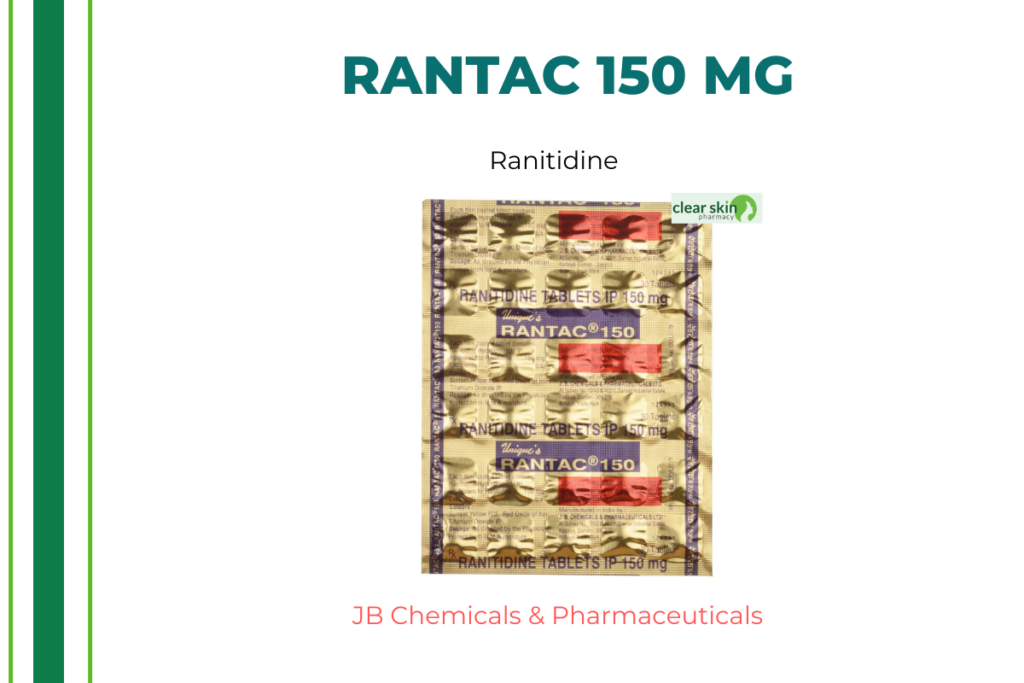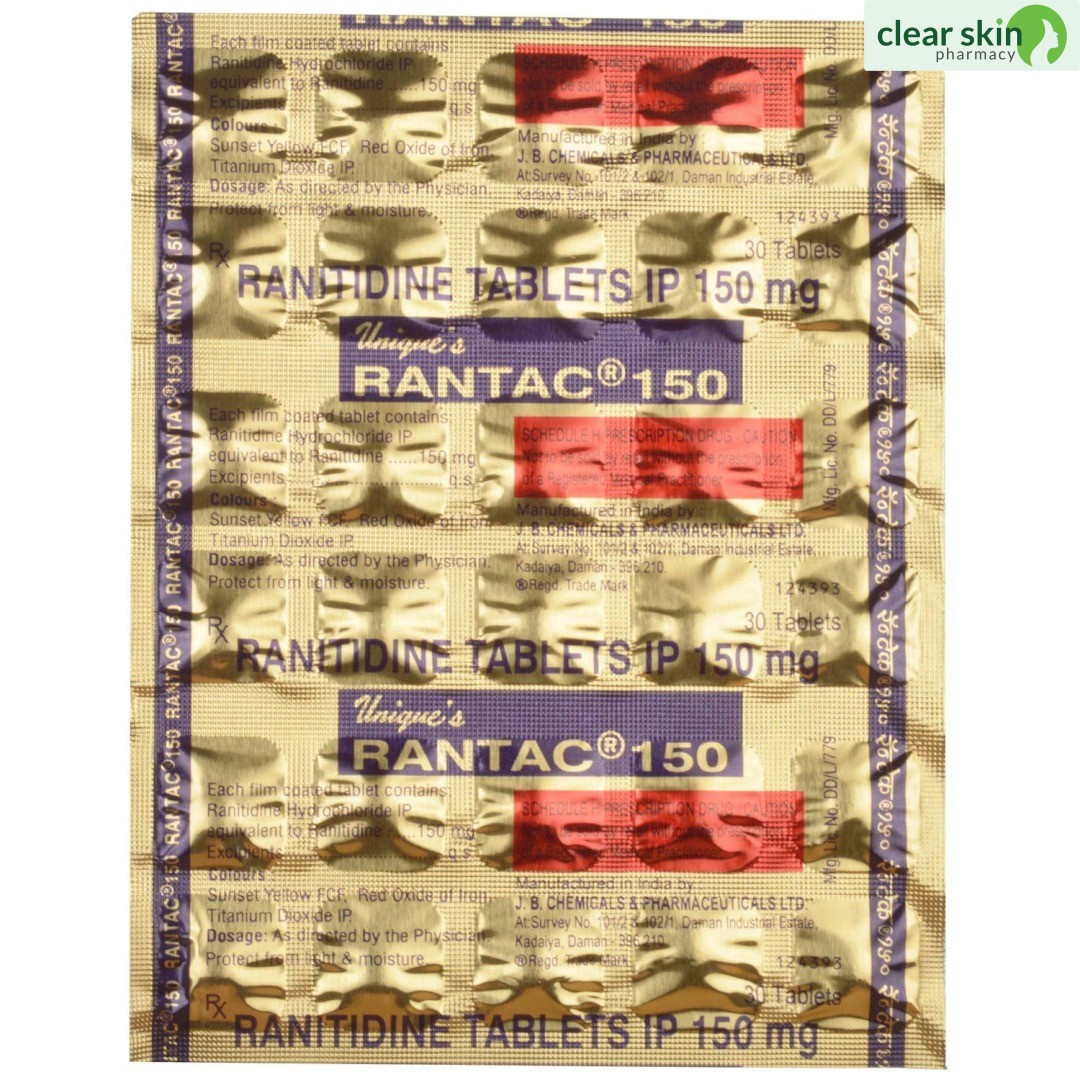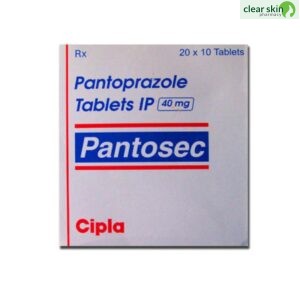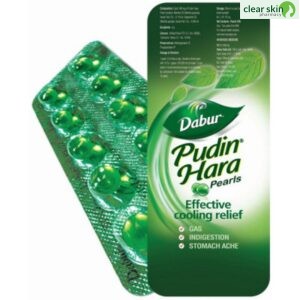Rantac 150 mg
Rantac 150 mg is a gastrointestinal medication that reduces the quantity of stomach acid produced. Rantac 150 mg is employed to treat indigestion, heartburn, and acid reflux. Additionally, Rantac 150 mg is used to treat gastroesophageal reflux disease (GORD), which is persistent acid reflux. Also prescribed for the prevention and treatment of stomach ulcers is Rantac 150 mg. Zollinger-Ellison Syndrome, a rare disease caused by a tumor in the pancreas or intestine, is usually treated with Rantac 150 mg.
GERD is a condition in which the highest portion of the stomach’s valve (sphincter) becomes irritated and damaged due to excessive stomach acid production. As a result, stomach acid seeps into the esophagus, producing stomach pain and heartburn. As a result of acid reflux, heartburn is a burning feeling that rises from the stomach to the neck.
Histamine-2 (H2) receptor blocker Rantac 150 mg decreases stomach acid by blocking the effects of the H2 receptor. The excess production of gastric acid affects the tissues of the esophagus, stomach, and duodenum. The H2 receptor is present in the parietal cells of the stomach wall, which secrete gastric acid.
For optimal benefits, Rantac 150 mg should be taken an hour before or after a meal. Rantac 150 mg should be swallowed whole with a full glass of water. It should not be broken, crushed, or chewed. It would be advantageous if you remained taking your medication for as long as your doctor instructed. If you discontinue treatment too soon, your symptoms may return and your condition may worsen. Headache, diarrhea, constipation, and shortness of breath are frequent adverse effects of Rantac 150 mg. These negative effects are temporary and may diminish over time. If these adverse effects persist, consult your doctor.
Avoid liquids containing caffeine (tea, coffee), spicy/deep-fried/processed foods, carbonated beverages, and acidic foods such as citrus fruits. Inform your doctor if you have an allergy to Rantac 150 mg, stomach or intestinal cancer, liver illness, or if you will undergo an endoscopy soon.

Rantac 150 mg uses
Heartburn, Gastroesophageal Reflux Disease (GERD), Acid Reflux, and Peptic Ulcer
Medicinal Advantages
The 150 mg dose of Rantac reduces excess stomach acid. As a result, it prevents the development of a stomach ulcer (peptic ulcer), gastroesophageal reflux disease (GERD) with or without ulcer, and Zollinger Ellison Syndrome, a condition in which the stomach produces too much acid.
Use Instructions
Rantac 150 mg should be administered one hour prior to a meal. Rantac 150 mg should be swallowed whole with a full glass of water. It should not be broken, crushed, or chewed. Liquid Rantac 150 mg is also available for those who cannot swallow tablets or capsules.
Storage
Place in a cool, dry area out of direct sunlight.
Rantac 150 mg Side Effects
As with all medications, Rantac 150 mg has some common side effects. Headache, constipation, diarrhoea, and stomach pain are among the common side effects of Rantac 150 mg. These negative effects are temporary and may diminish over time. However, if adverse symptoms persist, consult a physician.
Drug Recommendations
If you are allergic to Ranitidine or H2 receptor blockers, if you have gastric cancer or liver illness, if you are pregnant or planning to become pregnant, or if you are breastfeeding, you should not use Ranitidine. A blood thinner (warfarin), antifungal (ketoconazole), or anti-HIV drug may interact with ranitidine ( atazanavir). Inform your physician if you are taking any of the drugs listed here. Due to the fact that Ranitidine might mask the symptoms of gastric cancer, if you experience severe stomach pain or gastric bleeding (blood in your stool or mucus), you should visit a doctor immediately.
Interactions Between Drugs
Antacids for blood thinners (warfarin), antifungals (ketoconazole), and HIV medications (atazanavir) all interact with ranitidine (aluminum hydroxide). Inform your physician if you are taking any of the drugs listed here.
Consuming alcohol or nicotine (tobacco) while taking Ranitidine might cause dehydration and increase stomach acid levels, so decreasing the effectiveness of the medication.
Ranitidine should not be given to patients with stomach bleeding, liver/kidney disease, or vitamin B12 deficiency (anemia).
Safety Suggestions
ALCOHOL
Consuming alcohol while taking Ranitidine may result in dehydration and an increase in stomach acid, so diminishing its efficacy. As a result, avoid alcohol as much as possible.
PREGNANCY
Before taking Ranitidine, consult your physician.
BREAST FEEDING
Before taking Ranitidine, consult your physician. Before prescribing it to you, your physician will weigh the benefits and potential risks.
DRIVING
Some people may experience dizziness and drowsiness when taking ranitidine. If you are experiencing any of these symptoms, do not drive or operate heavy machinery until you feel better.
LIVER
Please see your physician before to taking any drug if you have a history of or symptoms of liver-related conditions.
KIDNEY
Please see your physician before to taking any drug if you have a history of or exhibit symptoms of kidney-related illnesses.
No habit formation
Advice on Diet and Lifestyle
Avoid foods and beverages that trigger acid reflux or heartburn, including onions, peppermint, chocolate, caffeinated beverages, citrus fruits or juices, tomatoes, and high-fat, spicy dishes.
Before going to sleep, try to raise your bedhead so that your head and chest are higher than your feet. A single elevated block will suffice in place of stacked pillows. This will prevent stomach acid from entering the food supply.
Don’t drink alcoholic beverages or smoke cigarettes. Alcohol can cause heartburn and acid reflux by stimulating the production of stomach acid. In contrast, nicotine smoking affects the valve (sphincter) that prevents stomach acid from flowing back into the food pipe.
Include foods high in fiber in your diet, such as berries, cherries, leafy green vegetables (kale, spinach), and black pepper. These foods are rich in antioxidants, calcium, and vitamin B 12, which can help you manage the long-term effects of the medication. Fermented dairy products, such as miso, sauerkraut, and kimchi, contain probiotics that aid in reducing excessive stomach acid production. Cranberry juice can benefit both peptic ulcers and H Pyroli infections.
Long periods of sitting could increase stomach acid production. Try to take a five-minute break every hour by walking or stretching vigorously.
Additional Information : This item is non-refundable.
Concerns of Patients
Typically, a thick layer of mucus protects the stomach from its own acid production. In contrast, excessive stomach acid production erodes it over time, leading to issues such as GERD, peptic ulcers, and Zollinger-Ellis Syndrome. GERD is a digestive disorder in which stomach acid regularly flows back into the esophagus. Acid reflux irritates the esophagus and causes heartburn. In contrast, a peptic ulcer is a painful condition characterized by sores or ulcers in the stomach lining or duodenum. The Zollinger-Ellison Syndrome is a rare condition in which a pancreatic gastric secreting tumor develops peptic ulcers as a result of excessive acid production.
FAQs
Heartburn and acid reflux are caused by an excess of stomach acid, which ranitidine prevents. Consult a physician immediately if you notice blood in your feces or mucous.
You can take ranitidine with or without food. Take your medication 30 minutes before taking a beverage, snack, or meal if you feel symptoms after eating or drinking.
Within 15 minutes of administration, ranitidine becomes effective. It is claimed to have effects that endure the entire day or night.
There are a few serious side effects associated with ranitidine, although they are uncommon. Some of the potential bad effects include hives, rash, itching, and difficulty breathing. If you experience any of these side effects, consult your physician.






Be the first to review “RANTAC 150 MG 30 Tablets”